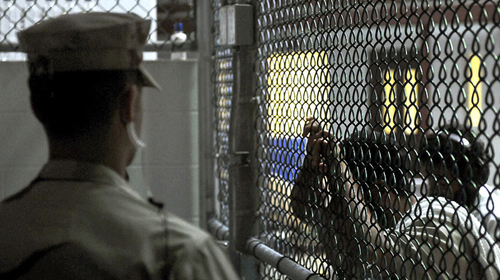
As debate rages about the National Security Agency vacuuming up Americans' phone and Internet data, a different form of government surveillance is on the docket here in Guántanamo. This week, at the military commission pre-trial hearings of Abd al Rahim Al-Nashiri, arguments have concerned the extent of the government's monitoring of attorney–client communications and how that monitoring will impact the proceedings.
In recent months, the military commission trials have been plagued by revelations that the government has maintained audio-monitoring equipment in rooms used for attorney–client meetings and that thousands of defense data files may have been deleted from the Pentagon computer system. These issues remain live and unresolved as a week of hearings comes to a close—13 years after the attack on the U.S.S. Cole that Al-Nashiri is alleged to have masterminded, and over a decade after he was taken into U.S. custody.
Wednesday in the Al-Nashiri hearing, a witness from the Office of the Chief Defense Counsel (OCDC), Brian Broyles, testified that the defense is still trying to account for hundreds of thousands of defense files—and that the prosecution was somehow granted access (though perhaps only for minutes) to an earlier backup of the network files of all defense teams. Boyles also testified that searches by the government (Individual Search Requests, or ISRs) in response to court, congressional and agency inquiries for specific information—including, perhaps, intelligence agencies—of Department of Defense (DoD) computer systems have for years made no distinctions between prosecution and defense files when running keyword searches on the network. Additionally, Boyles explained that the DoD has been monitoring defense computers—and using search terms related to detainees—without making any allowance for the fact that such searches might reveal the contents of privileged attorney work.
In a press conference at the close of the hearings, Al-Nashiri’s defense attorney, Richard Kamen, said that the military defense lawyers on his team have been prohibited at the direction of OCDC from using their military email accounts or accessing network files until the issues are resolved – because of a concern about the risk of breach of confidential information and of ethical duties to maintain it. The defense has asked that the proceedings be abated until those imperative concerns can be addressed. (OCDC is working with the Convening Authority to modify the computer system and network to solve the problem.) The judge still hasn’t ruled.
Thursday, the facility’s commander, John Bogdan, testified that before he ordered (in late January or early February) the removal of smoke detectors in which microphones had been secretly installed, the government had possessed the capability to audio monitor attorney–client meetings at the facility’s meeting rooms since at least 2008. It’s unclear if and to what extent the government exercised that capability. To this day, the government maintains video monitoring equipment with significant zoom capability in those meeting rooms.
The defense called the revelations “the perfect demonstration of plausible deniability.”
Moreover, earlier this week during a tour of the courtroom complex, John Imhof, the officer in charge of the Office of Military Commissions–South, told press and NGO observers that officials had recently discovered that the video feed from pre-trial holding cells in which detainees meet with their attorneys at the court complex had, in fact, been recorded for months.
These breaches, taken together, show extraordinary obstacles to the effective assistance of defense counsel at Guántanamo. They cast doubt, to say the least, on the government’s commitment and efforts to ensuring that those tried in the Guántanamo military commissions receive the basic fairness rights that the Constitution and human rights law require in a criminal trial. We expect much more detail on these issues during the military commissions proceedings in the 9/11 cases, which resume on Monday.
Trials—and especially trials like Al Nashiri’s in which the death penalty is at stake—require that defense attorneys be able to maintain the confidentiality of meetings and communications with their clients, as well as their work and any information related to their case strategy. These issues have been raised again and again by defense teams, without an ultimate resolution by the military commission. Boyles’s and Bogdan’s testimony should prompt the court to finally determine these questions on the record.
Since they began, the ACLU has been visiting Guántanamo Bay to report on the systemic flaws in the Military Commissions and call for its closure. As the trials proceed, the cracks in the façade just keep growing.
Learn more about the Guantánamo Bay detention center and other civil liberties issues: Sign up for breaking news alerts, follow us on Twitter, and like us on Facebook.

